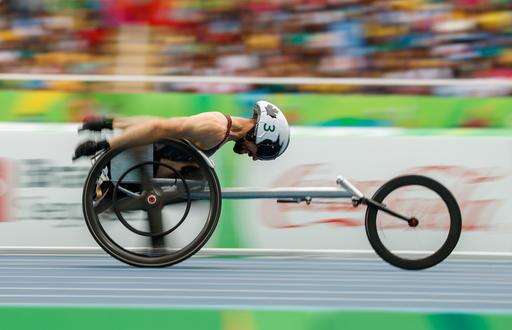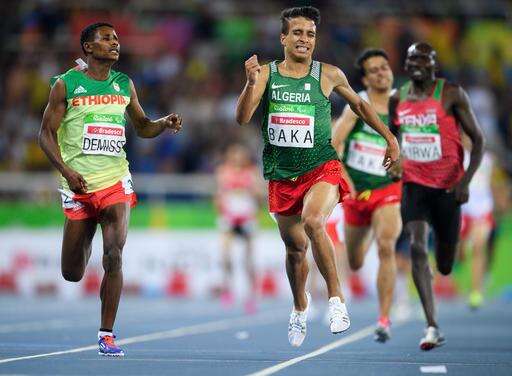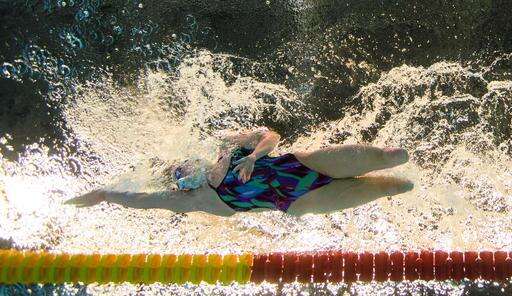In this Saturday, Sept. 10, 2016 photo gallery, Liesette Bruinsma, from the Netherlands, competes in the women's 400-meter freestyle S11 final swimming competition at the Paralympic Games in Rio de Janeiro, Brazil. Bruinsma went on to win the gold medal. The Paralympic Games have passed their midpoint, overcoming budget problems to stage what has been a successful competition with higher-than-expected attendance and dozens of records. (AP Photo/Leo Correa)
The Associated Press
RIO DE JANEIRO (AP) - The Paralympic Games are in the home stretch, having overcome budget problems to stage a highly successful competition that has seen higher-than-expected attendance and a slew of record-setting performances.
About 4,350 athletes are competing, each with unique differences that have to be classified. Lines have to be drawn to group similar impairments, or impairments that yield similar results. There are 10 impairment groups based on physical, visual and intellectual criteria. But the 22 Paralympic sports adjust the groups to suit their individual events, swelling the classifications to hundreds.
The games needed a bailout from Brazil's government of almost $80 million to make it to the starting line. Only 200,000 tickets had been sold a few weeks before the opening ceremony Aug. 7, but officials said demand picked up and they had sold nearly their goal of 2.4 million. That is partly a result of the price for many tickets, only 10 Brazilian reals ($3) - an enticing offer in a country that is mired in its worst recession in decades.
The Paralympics are more than a benign version of the Olympics. In fact, a few performances have been better than the Olympics.
The top four runners in the men's 1,500-meter Sunday - in the T13 class for visually impaired - all had better times than the Olympic champion in last month's Rio Olympics, American Matthew Centrowitz. Abdellatif Baka of Algeria won in 3 minutes, 48.28 seconds. Centrowitz ran 3:50.00 in an admittedly slow, tactical race. Ethiopia's Tamiru Demisse in second, Kenya's Henry Kirwa at third and Algeria's Fouad Baka in fourth also beat Centrowitz's time.
In many countries, Paralympians get significantly less support than Olympians. The U.S. Olympic Committee awards athletes $25,000 for a gold medal. American Paralympic athletes get $5,000.
One sport at the Paralympics that doesn't appear in any form at the Olympics is goalball, in which athletes with visual impairments wear masks to completely block their vision. The athletes try to throw or roll the ball past the end line with opposing defenders trying to block the ball. The ball contains a bell so the athletes are able to react to the shot.
In this Friday, Sept. 9, 2016 photo, Britain's Jody Cundy competes to win the gold in the men's C4-5 1,000-meter time trial during the Paralympic Games at the Olympic Velodrome in Rio de Janeiro, Brazil. The 37-year-old claimed his sixth Paralympic gold in Rio, denied to him during the London Olympics Games in 2012, when officials ruled he had false started. (AP Photo/Mauro Pimentel)
The Associated Press
In this Friday, Sept. 9, 2016 photo, China athletes listen to the men's preliminary round Group B goalball match against United States, during the Paralympic Games, at Future Arena, in Rio de Janeiro, Brazil. United States won 5-2. The Paralympics sport goal ball is one sport that doesn't appear in any form at the Olympics. Athletes with visual impairments wear masks to completely block their vision. The athletes try to throw or roll the ball past the end line with opposing defenders trying to block the ball. (AP Photo/Mauro Pimentel)
The Associated Press

In this Friday, Sept. 9 2016 photo provided by the IOC, Canada's wheelchair racer Brent Lakatos competes in the men's 100-meter T53 - Round 1, at the Paralympic Games, in Rio de Janeiro, Brazil. When the curtain went up for 4,300 athletes at Wednesday's opening ceremony, almost everything was scaled back: venues, seating, and staffing. Paralympic officials said that no sports or nations were cut out. (Simon Burty/OIS,IOC via AP)
The Associated Press

In this Sunday, Sept. 11, 2016 photo released by IOC, Algeria's Abdellatif Baka narrowly wins the gold ahead of Ethiopia's Tamiru Demisse in the men's 1,500-meter T13 final athletics event at Olympic Stadium during the Paralympic Games in Rio de Janeiro, Brazil. he Paralympics are more than a benign version of the Olympics. In fact, a few performances have been better than the Olympics. The top four runners in the men's 1,500-meter Sunday - in the T13 class for visually impaired - all had better times than the Olympic champion in last monthâs Rio Olympics, American Matthew Centrowitz. (Bob Martin/OIS,IOC via AP)
The Associated Press
In this Sunday, Sept. 11, 2016 photo, Britain's Richard Whitehead celebrates winning the gold medal in the men's 200-meter - T42 final event of the Paralympic Games in Rio de Janeiro, Brazil. The 40-year-old amputee sprinter crossed the finish line in 23.39 seconds to win a gold medal. (AP Photo/Leo Correa)
The Associated Press
In this Saturday, Sept. 10, 2016 photo released by the IOC, swim exit handlers help Italy's Giovanni Achenza out of the water during the men's PT1 triathlon on Copacabana beach, during the Paralympic Games in Rio de Janeiro, Brazil, Saturday, Sept. 10, 2016. All paratriathlon competitors compete over a course of 750m of swimming, 20km of cycling and 5km of running. The PT1 category is reserved for wheelchair users. (Simon Bruty/OIS,IOC via AP)
The Associated Press
In this Friday, Sept. 9, 2016 photo provided by the IOC, Trinidad and Tobago's Shanntol Ince competes in heat 1 of the women's 400-meter freestyle - S9 swimming event at the Olympic Aquatics Stadium during the Paralympic Games, in Rio de Janeiro, Brazil. The 21-year-old Paralympian, who learned to swim at the age of 4, was born with her right leg shorter than her left. (Bob Martin/OIS,IOC via AP)
The Associated Press
In this Monday, Sept. 12, 2016 photo released by the IOC, Moldova's Alexandr Covaliov is helped with his swim googles as he leaves the pool after competing in a men's 50-meter freestyle S11swimming heat at Olympic Aquatics Stadium during the Paralympic Games in Rio de Janeiro, Brazil. About 4,350 athletes are participating, each with unique differences that have to be classified. Lines have to be drawn to group similar impairments, or impairments that yield similar results. (Al Tielemans for OIS/IOC via AP)
The Associated Press

In this Thursday, Sept. 8, 2016 photo provided by the IOC, Jessica Long, of the United States, swims laps in a training session at the Olympic Aquatics Stadium during the Paralympic Games, in Rio de Janeiro, Brazil. There are 10 impairment groups based on physical, visual and intellectual criteria. But the 22 Paralympic sports adjust the groups to suit their individual events, swelling the classifications to hundreds. (Photo Bob Martin/OIS/IOC via AP)
The Associated Press
In this Monday, Sept. 12, 2016 photo, athletes compete in the women's 400-meter T44 final athletics event of the Paralympic Games in Rio de Janeiro, Brazil. The games needed a bailout from Brazil's government of almost $80 million to make it to the starting line. Only 200,000 had been sold a few weeks before the opening ceremony Aug. 7. But officials said sales picked up and they had sold nearly their goal of 2.4 million. (AP Photo/Mauro Pimentel)
The Associated Press
In this Tuesday, Sept. 13, 2016 photo released by the IOC, China's Xufeng Zou, right, competes against China's Jing Bian, to win the gold in the women's individual epee category A wheelchair fencing event at the Paralympic Games in Rio de Janeiro, Brazil. After competition ended on Tuesday, China held a huge lead at the top of the board with 147 total medals (63 golds) through six days of competition. (Thomas Lovelock/OIS,IOC via AP)
The Associated Press
In this Monday, Sept. 12, 2016 photo, Brazil's Terezinha Guilhermina competes in a women's 200-meter T11 athletics heat during the Paralympic Games in Rio de Janeiro, Brazil. The Paralympic Games have passed their midpoint, overcoming budget problems to stage what has been a successful competition with higher-than-expected attendance and dozens of records. (AP Photo/Mauro Pimentel)
The Associated Press
In this Thursday, Sept. 8, 2016 photo, Nate Hinge, of the United States, falls to get control the ball as Brazil's Leandro de Miranda looks on during a men's group B preliminary wheelchair basketball game during the Paralympic Games in Rio de Janeiro, Brazil. In many countries, Paralympians get significantly less support than Olympians. The U.S. Olympic Committee awards athletes $25,000 for a gold medal. American Paralympic athletes get $5,000. (AP Photo/Silvia Izquierdo)
The Associated Press
In this Sunday, Sept. 11, 2016 photo released by the IOC, South Africa's Ntando Mahlangu prepares to compete in the men's final 200-meter T42 athletics event at Olympic Stadium during the Paralympic Games in Rio de Janeiro, Brazil. On Sunday the 14-year-old blade runner became a silver Paralympian. (Thomas Lovelock/OIS,IOC via AP)
The Associated Press
In this Thursday, Sept. 8, 2016 photo, silver medal winner Lu Dong, from China, competes in the women's 100-meter backstroke S6 swimming event at the Paralympic Games in Rio de Janeiro, Brazil. This year, China has more than 300 athletes, a physical representation of the country's commitment to keeping its spot as a Paralympic powerhouse, but it can also be seen as a strategy: More athletes competing means more opportunities to collect medals. (AP Photo/Leo Correa)
The Associated Press
Matt Stutzman, of United States, holds the bow with his foot as he competes in the individual compound-open, during the Paralympic Games at the Sambadrome, in Rio de Janeiro, Brazil, Wednesday, Sept. 14, 2016. He holds a world record for the most accurate distance shot in archery, which includes able-bodied archers. (AP Photo/Silvia Izquierdo)
The Associated Press
In this Monday, Sept. 12, 2016 photo released by the IOC, China's Shuo Yan wins 3-1 against Spain's Jordi Morales Garcia in the men's singles - class 7 table tennis bronze medal match of the Rio Paralympics. China has topped the medal board in the last three Summer Paralympics, beginning at the 2004 Athens Games. (Thomas Lovelock/OIS, IOC via AP)
The Associated Press
In this Thursday, Sept. 8, 2016 photo, Zheng Tao of China warms up before the men's 100-meter backstroke S6 swimming competition at the Paralympic Games in Rio de Janeiro, Brazil. Last Friday, China won 14 medals in swimming, including two all-China podiums in men's 50- and 100-meter butterfly races. The victories have not stopped. (AP Photo/Leo Correa)
The Associated Press
In this Saturday, Sept. 10, 2016 photo, Italy's Giovanni Achenza competes in the men's triathlon PT1 athletics event at the Paralympic Games at Copacabana beach, in Rio de Janeiro, Brazil. Officials say 159 nations sent competitors to the Paralymoics in Rio, and there is a refugee team. Missing are 267 Russian athletes who were banned because of alleged state-sponsored doping. (AP Photo/Leo Correa)
The Associated Press
In this Monday, Sept. 12, 2016 photo, winners of the gold medal in the men's 4x100-meter - T42-47, Germany's Markus Rehm, from left to right, David Behre, Felix Streng, and Johannes Floors, pose with their country's national flag in the Paralympic Games in Rio de Janeiro, Brazil. The Paralympic Games have passed their midpoint, overcoming budget problems to stage what has been a successful competition with higher-than-expected attendance and dozens of records. (AP Photo/Mauro Pimentel)
The Associated Press